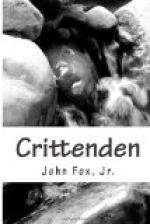“Yes,” laughed Mrs. Crittenden. “You can eat strawberries now. You can balance them against his cocoanuts.”
Phyllis picked up the paper then, with a cry of surprise—the name signed to the article was Grafton, whom she had seen at the recruiting camp. And then she read the last paragraph that the mother had not read aloud, and she turned sharply away and stooped to a pink-bed, as though she would pick one, and the mother saw her shoulders shaking with silent sobs, and she took the child in her arms.
There was to be a decisive fight in a few days—the attack on Santiago—that was what Phyllis had read. The Spaniard had a good muster-roll of regulars and aid from Cervera’s fleet; was well armed, and had plenty of time to intrench and otherwise prepare himself for a bloody fight in the last ditch.
So that, each day there was a relief to the night agony, which, every morning, began straightway with the thought that the fight might be going on at that very hour. Not once did Judith come near. She had been ill, to be sure, but one day Mrs. Crittenden met her on the way to town and stopped her in the road; but the girl had spoken so strangely that the mother drove on, at loss to understand and much hurt. Next day she learned that Judith, despite her ill health and her father’s protests, had gone to nurse the sick and the wounded—what Phyllis plead in vain to do. The following day a letter came from Mrs. Crittenden’s elder son. He was well, and the mother must not worry about either him or Basil. He did not think there would be much fighting and, anyhow, the great risk was from disease, and he feared very little from that. Basil would be much safer as an aid on a General’s staff. He would get plenty to eat, would be less exposed to weather, have no long marches—as he would be mounted—and no guard duty at all hours of day and night. And, moreover, he would probably be less constantly exposed to bullets. So she must not worry about him. Not one word was there about Judith—not even to ask how she was, which was strange. He had said nothing about the girl when he told his mother good-by; and when she broached the subject, he answered sadly:
“Don’t, mother; I can’t say a word—not a word.”
In his letter he had outlined Basil’s advantages, not one of which was his—and sitting on the porch of the old homestead at sunset of the last rich day in June, the mother was following her eldest born through the transport life, the fiery marches, the night watches on lonely outposts, the hard food, the drenching rains, steaming heat, laden with the breath of terrible disease, not realizing how little he minded it all and how much good it was doing him. She did know, however, that it had been but play thus far to what must follow. Perhaps, even now, she thought, the deadly work was beginning, while she sat in the shrine of peace—even now.




